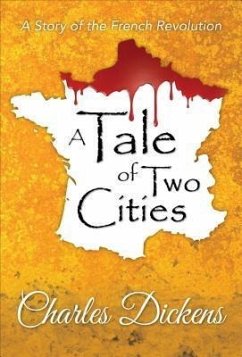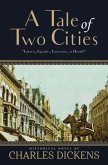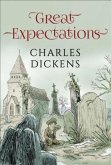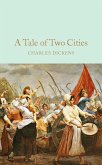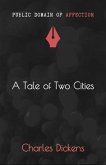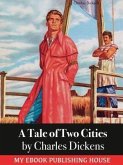The story of 'A Tale of Two Cities' is set in the late 18th Century in London and Paris, before and during the French Revolution. It was a time when injustice was met by a lust for vengeance, and rarely was a distinction made between the innocent and the guilty. It was published in weekly installments from April 1859 to November 1859 in Dickens's new literary periodical titled 'All the Year Round'. This novel is regarded as one of Dickens's most popular and most innovative works. After eighteen years as a political prisoner in the Bastille the aging Dr Manette is finally released and reunited with his daughter in England. There, two very different men, Charles Darnay, an exiled French aristocrat, and Sydney Carton, a disreputable but brilliant English lawyer, become enmeshed through their love for Lucie Manette. From the tranquil lanes of London, they are all drawn against their will to the vengeful, bloodstained streets of Paris at the height of the Reign of Terror and soon fall under the lethal shadow of La Guillotine. The book is perhaps best known for its opening lines, "It was the best of times, it was the worst of times," and for Carton's last speech, in which he says of his replacing Darnay in a prison cell, "It is a far, far better thing that I do, than I have ever done; it is a far, far better rest that I go to, than I have ever known."
ABOUT THE AUTHOR: Charles Dickens (7 February 1812 - 9 June 1870) was an English writer and social critic. He created some of the world's best-known fictional characters and is regarded as the greatest novelist of the Victorian era. His works enjoyed unprecedented popularity during his lifetime, and by the twentieth century critics and scholars had recognised him as a literary genius. His novels and short stories enjoy lasting popularity. The second of eight children, he grew up in a family frequently beset by financial insecurity. At age eleven, Dickens was taken out of school and sent to work in London backing warehouse, where his job was to paste labels on bottles for six shillings a week. His father John Dickens, was a warmhearted but improvident man. When he was condemned the Marshela Prison for unpaid debts, he unwisely agreed that Charles should stay in lodgings and continue working while the rest of the family joined him in jail. This three-month separation caused Charles much pain; his experiences as a child alone in a huge city - cold, isolated with barely enough to eat - haunted him for the rest of his life.
When the family fortunes improved, Charles went back to school, after which he became an office boy, a freelance reporter and finally an author. With 'Pickwick Papers' (1836-7) he achieved immediate fame; in a few years he was easily the most popular and respected writer of his time. It has been estimated that one out of every ten persons in Victorian England was a Dickens reader. 'Oliver Twist' (1837), 'Nicholas Nickleby' (1838-9) and 'The Old Curiosity Shop' (1840-41) were huge successes. 'Martin Chuzzlewit' (1843-4) was less so, but Dickens followed it with his unforgettable, 'A Christmas Carol' (1843), 'Bleak House' (1852-3), 'Hard Times' (1854) and 'Little Dorrit' (1855-7) reveal his deepening concern for the injustices of British Society. 'A Tale of Two Cities' (1859), 'Great Expectations' (1860-1) and 'Our Mutual Friend' (1864-5) complete his major works. Dickens's marriage to Catherine Hoggarth produced ten children but ended in separation in 1858. In that year he began a series of exhausting public readings; his health gradually declined. After putting in a full day's work at his home at Gads Hill, Kent on June 8, 1870, Dickens suffered a stroke, and he died the following day.
ABOUT THE AUTHOR: Charles Dickens (7 February 1812 - 9 June 1870) was an English writer and social critic. He created some of the world's best-known fictional characters and is regarded as the greatest novelist of the Victorian era. His works enjoyed unprecedented popularity during his lifetime, and by the twentieth century critics and scholars had recognised him as a literary genius. His novels and short stories enjoy lasting popularity. The second of eight children, he grew up in a family frequently beset by financial insecurity. At age eleven, Dickens was taken out of school and sent to work in London backing warehouse, where his job was to paste labels on bottles for six shillings a week. His father John Dickens, was a warmhearted but improvident man. When he was condemned the Marshela Prison for unpaid debts, he unwisely agreed that Charles should stay in lodgings and continue working while the rest of the family joined him in jail. This three-month separation caused Charles much pain; his experiences as a child alone in a huge city - cold, isolated with barely enough to eat - haunted him for the rest of his life.
When the family fortunes improved, Charles went back to school, after which he became an office boy, a freelance reporter and finally an author. With 'Pickwick Papers' (1836-7) he achieved immediate fame; in a few years he was easily the most popular and respected writer of his time. It has been estimated that one out of every ten persons in Victorian England was a Dickens reader. 'Oliver Twist' (1837), 'Nicholas Nickleby' (1838-9) and 'The Old Curiosity Shop' (1840-41) were huge successes. 'Martin Chuzzlewit' (1843-4) was less so, but Dickens followed it with his unforgettable, 'A Christmas Carol' (1843), 'Bleak House' (1852-3), 'Hard Times' (1854) and 'Little Dorrit' (1855-7) reveal his deepening concern for the injustices of British Society. 'A Tale of Two Cities' (1859), 'Great Expectations' (1860-1) and 'Our Mutual Friend' (1864-5) complete his major works. Dickens's marriage to Catherine Hoggarth produced ten children but ended in separation in 1858. In that year he began a series of exhausting public readings; his health gradually declined. After putting in a full day's work at his home at Gads Hill, Kent on June 8, 1870, Dickens suffered a stroke, and he died the following day.
Dieser Download kann aus rechtlichen Gründen nur mit Rechnungsadresse in A, D ausgeliefert werden.

